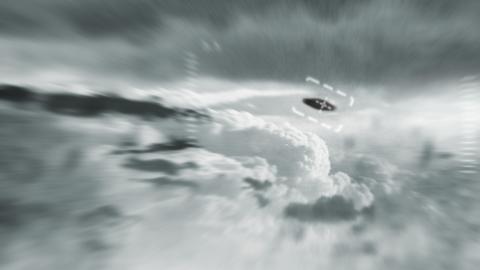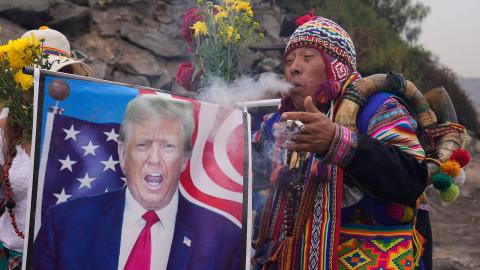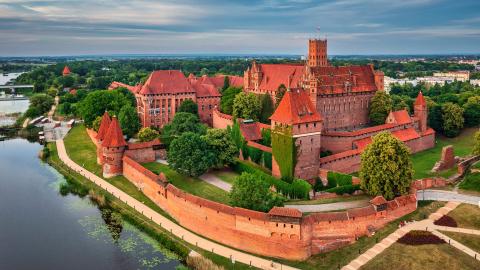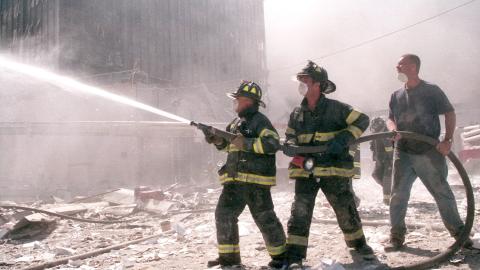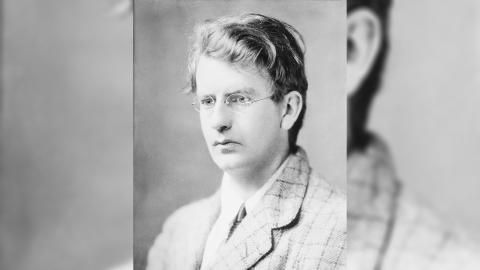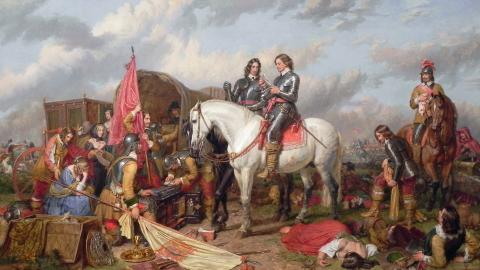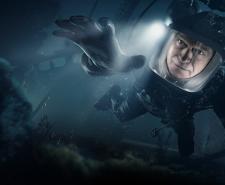
Ross Kemp on filming Deep Sea Treasure Hunter S1: 'I am as soft as it gets!'
Ross Kemp uncovers Britain’s hidden maritime past in Ross Kemp: Deep Sea Treasure Hunter
In Deep Sea Treasure Hunter S1 , Ross Kemp dives a series of incredible shipwrecks around the British coastline to reveal some of the nation’s murkiest and best-kept secrets.
From the remains of a slave ship discovered off Plymouth, to the Kaiser’s sunken Imperial Fleet in Scapa Flow and an experimental submarine aircraft carrier, which sank with all passengers and crew on deck during its sea trials, Ross uncovers Britain’s hidden maritime past.
For season 1 which first aired in 2022, Sky HISTORY spoke to Ross about the series and why Ross Kemp: Deep Sea Treasure Hunter is one of the most enjoyable shows he's ever made.
What were the most difficult challenges that you faced while learning to dive?
It's not just about making sure that you can survive underwater, it's understanding the science behind why you can survive underwater. Did you know that oxygen becomes poisonous at a certain depth?
Can you talk about your family connection to the wreck of the HMS Hood and your grandfather’s experiences in the Merchant Marines?
My great-uncles, Bertie and Albert went down on the HMS Hood. The Hood, which is called 'the mighty Hood' was one of the biggest battleships we had. It was sent out of the Orkney Islands out Scapa Flow, and sadly, it was blown up by the Bismarck. I think there were 1,400 sailors at the time on board, only three survived.
It's surprising that even three survived considering the description of the explosion. They believe the shell went straight down through the deck and hit the magazine, which is where all the armaments are stored. It went down, in three minutes and let me tell you, the water in the straits of Denmark is cold. Even if people were on deck, and survived, many of them perished because of the cold. So, there's a connection there with the Hood.
My great grandfather Pop was part of the same family, and he joined the Royal Navy at a very young age at 12 or 13. He did that for two years and then he joined the Merchant Navy, where he stayed until he was in his early 70s. He was shipwrecked twice during the Second and once during the First World War and managed to live to tell the tale.
I have a picture of him when I was very young, sat on his knee. Apparently, I was fascinated by him because he smoked a pipe, hence his name 'Popeye'.
So, I was always brought up with stories of shipwrecks and I've always been fascinated with water. I love being in the water. So, when this project came along, I jumped at it.
Did taking part in the show change your view about the past?
I had no idea about British business, interfering in the war of the Confederacy.
By diving on the Iona II off Lundy, I found out that British businessmen, 30 years after the abolition of slavery in the United Kingdom, were very happily supplying guns and aid to the Confederacy.
Had they not done that, the war between the North and the South could have been resolved some two years earlier, ending slavery two years earlier in the United States, saving thousands and thousands of lives.
It was just the pure greed of the people in this country that helped to prolong that very violent civil war.
You’re joined by some of the UK’s best divers, tell us about them.
They're not only brilliant divers, but they're also experts on those wrecks.
The entire team really came together whether I was diving, with Emily up in Scotland or down on the South Coast with Mallory. They were brilliant to work with. But it was Neil Brock, from Bristol Channel Divers and Mark Culwick, my safety diver who got me through it.
Which was your favourite shipwreck to explore?
I think they’re all particularly interesting, but they reveal dark parts of our history, parts we may not want to talk about or openly discuss. Diving on wrecks brings up subjects we may have tried to forget about, and you can't forget about it, because it's right there.
That's true of the Iona II and it’s true of the slaver ship. It was amazing, we're the first people, certainly the first crew to dive on that wreck and find those guns that were aimed at enslaved people to control them was quite shocking.
Do you have a favourite find?
It was on the HMS Amethyst which was a star of its day. It fought in the American War of Independence, and it sank numerous American, Spanish and French ships. It was considered one of the luckiest ships of its day. It was incredibly manoeuvrable. It was very fast and carried a lot of guns.
Bear in mind in those days, the Navy encouraged crews to keep a percentage of the booty if they took cargo vessels. So, it was a ship that people wanted to be on because not only was it the fastest and most heavily gunned, but it was also considered very lucky and very profitable to be on.
She sank by mistake in Plymouth Sound and was buried in very shallow water but it's very dangerous water to get into. I personally found, with the help of Mallory and a metal detector, part of that copper hull.
In those days to make vessels sail quicker, they covered the hull in copper, and any vessel or anything belonging to the Navy in those days had an insignia on it,
I know that sounds like: 'Ross you found a little bit of copper that was at the side of a boat' but when you're the person that finds it, you understand why people go off metal detecting every weekend. There is an incredible sense of connection with your country's history. For me, connecting with history like that, makes it incredibly real.
We were looking at the edits and we had to take the 'Woahs' out because I'm going 'Woah...Woah!' all the time.
What did you learn about what life was like onboard for the crew from exploring these wrecks?
Imagine being on the front of a conning tower of a submarine with the waves coming over you. These guys didn't have Gortex, they wore wool in all weathers and went to bed soaking wet. I'll tell you what, it made me think I am as soft as it gets!
That's what's so special about diving on wrecks because these were places where people not only lived, but they also worked on them, they fought on them, they died on them. Every one of them has an individual story, of sacrifice, of love of determination.
It sounds a bit poetic, to say that you can sense that when you're down there but because it's so silent, and it's so majestic, it gave a very different feeling to looking at something above sea level. It's more tangible and it's more emotional.
Particularly for me the M2, which is a submarine that tragically went down in 1932, with everyone on board. Of course, because it's a war grave, you can't go into it but it wasn't lost on me that so many young, very brave men sadly lost their lives on that submarine. There was an atmosphere down there that felt very different some of the other vessels that we had dived on that didn't have such a loss of life.
What was the scariest part about filming the documentary?
There's always an element of danger with diving because of the rusty ships and the gale-force weather, which doesn't affect you much underneath the surface, but it certainly has an effect on getting in and getting out of the water. There's also all the strong tides and currents as well. The sheer scale of some of the wrecks, particularly up in Scapa Flow is just incredible.
Me and Mallory tried to dive on the James Eagan Layne off the Cornish Coast and the shot line had gone down to what we believe was the actual wreck. We knew were going into the hold, but the visibility was so bad that we missed it. We didn't know we missed it until I looked at my depth gauge and realised that we were at 33 metres now we should have landed on that deck of 20 metres. That doesn't sound like a big difference but when you suddenly think how much air you start consuming up the deeper go and we couldn't see where the ship was. I couldn't see something that was two and a half stories, three stories high.
By the time we've got into the hold, I’m going, ‘I want out of here’.
I don’t like the fact that I am now in a metal box, and I can't see further than the end of my hands. So, it's interesting how even though you train that hard and you've already been through that experience, one slight thing can start playing on your mind.
If you see that episode, you look at my face after I come out. Most of the time, I've got a smile of relief, thinking that was enjoyable, that was exciting, what did we find? This time….‘I want to go home’.
If you could go back in time and witness any historical event in person, what would it be and why?
There are so many things I would like to go back and see, as an amateur historian, just in terms of British history: the Norman invasions, Agincourt, the English Civil War, Trafalgar.
Trafalgar for me was a defining moment in British history. Some people say it led to an empire which we now rightly question, but it was a defining moment. It was when Britain became the most dominant power in Europe for a period.
Is there anything that divers do or could do more to protect the ocean and marine habitats?
Frankly, it's shocking what we've done to our oceans, and I was sadly made very aware of that during the making of these documentaries.
Mallory who is a marine archaeologist who works down the south coast has got a project going called 1000 Tires that aims to remove 1000 tires out of Plymouth Sound. I think that should be taken up globally.
Sadly, tires are just some things that we managed to pull out of the water, that is not treasure. That's pollution. I would urge anyone that's recreational diving or wreck diving, if you do have a line, please take them out of the ocean and find a better way of either recycling them or disposing of them.
I'm very lucky to have dived in the Maldives and a barrier reef in the past but I was honestly surprised at the amount of marine life that we do have in our waters, and you know, it's something that we should treasure, something that we should look after and not something that we should pollute.
Some people might say that those rusty wrecks are pollution, but they're there for a reason. They're part of the history of the story of these islands but rubber tires for me certainly aren't.
You’ve been presenting documentaries for a long time now, how does Deep Sea Treasure Hunter compare?
All I'll say is this in terms of having made a few documentaries in my time, this was a totally new adventure for me. Not that I'm ever in my safety zone or my comfort zone, but I certainly wasn't at the beginning of this. I was a little more in my safety zone at the end of it, but you know, when you're diving, you really got to be on your game at all times.
It will stand out to me as one of the most enjoyable shows I've ever made. It also hits so many levels to me, you know, it is there's a bit of jeopardy there, there’s teamwork, it’s exciting, it’s dangerous but also highly informative.
Are there any other shipwrecks you’d like to explore in a second series of this show?
This country is absolutely littered with shipwrecks because of our maritime past from all over the world. Undoubtably there is very still a lot to explore despite the amount of diving that's been done around the islands.
There must be gold out there, there has to be! I don't think I'm ever going to find any but as I say it's relative. One man's treasure is another man's rubbish. For me, just getting an insight into the way that people lived that’s the treasure. The bravery of those on board, the deviousness of those on board, the cruelty those on board; they're all stories that need to be told that needs to be brought to the surface. And I think diving on wrecks, is a great way of bringing history to life.
If you could dive anywhere in the world, where would be your ideal diving location or site to explore and why?
I've heard the Chuuk Lagoon in Micronesia is apparently the place to go. The visibility there is incredible. I'd like to go to the Red Sea and dive there. There is no shortage of wrecks all over the world. I do have a slight preference for something a little warmer than the North Sea. That's a big indication to those at Sky HISTORY!







